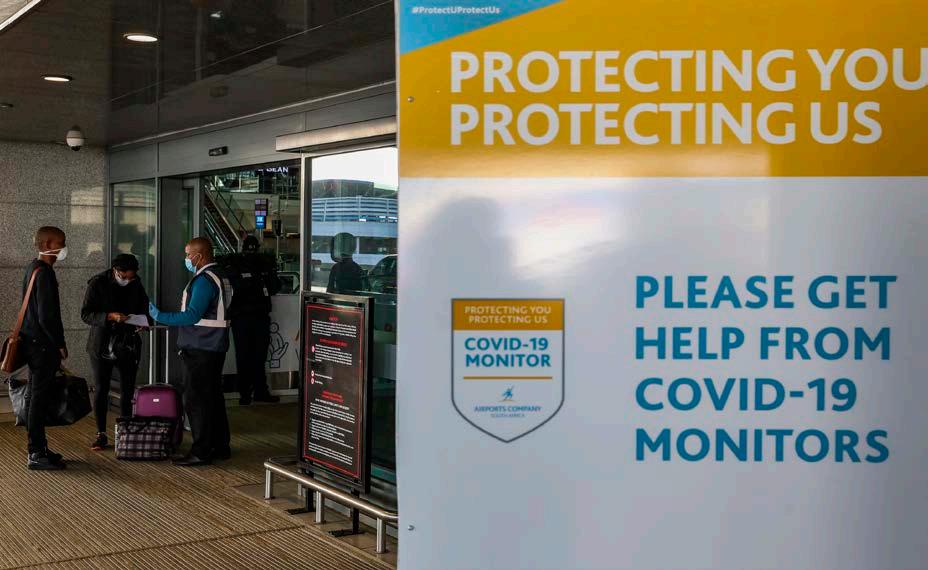
5 minute read
Cape Town Airport Update
CAPE TOWN AIRPORT Coping with Covid-19
WORDS: MIKE RABEC
Normally approximately 11 million passengers per year transit through Cape Town International Airport, making it the third largest in Africa. From having processed around 30,000 passengers each day, the airport has been brought to an almost complete standstill.
ON 23 March South Africa introduced lockdown regulations that grounded almost all aviation activity. After an initial total shutdown, a trickle of movement began when the airlines were permitted to operate repatriation flights to enable foreign residents stranded in South Africa to get home.
Visiting the airport under the lockdown is an eerie experience. The international departure and arrival halls are deserted, with row after row of check-in counters standing empty. Prior to the lockdown restrictions, the airport was handling as many as 40,000 passengers and 20,000 items of baggage in a day. Uplift of JetA1 dropped from 2.3 million litres per day to almost zero during the Level 5 and 4 lockdown period.
The restrictions have had a calamitous effect on the airport’s revenue. To find out how the airport is coping with the Covid-19 crisis, we spoke to Deon Cloete, Cape Town International Airport’s General Manager.
Cloete says the Airports Company of South Africa (ACSA) used the past two to three months for developing and implementing new procedures and protocols to minimise the risk to passengers in anticipation of a slow return to flying in Quarter 4 later this year. “The new protocols will require screening for all passengers – on both domestic and international routes. We have developed these new end-to-end procedures in close collaboration with key industry players i.e. non-ACSA airports such as Lanseria, local and international airlines, government and regulatory bodies. Suffice to say there has been a lot of learning with regular updates and tweaking happening along the way. We also leaned heavily on best practices recommended by the likes of IATA, ICAO and ACI.”
While it is still early days we are confident that the new procedures and systems have created the right spaces for safe passenger processing and facilitation. We will keep a beady eye on innovation and

new technologies that will further improve the effectiveness of passenger health screening, and we will remain current with similar systems being implemented in many airports around the world. These enable us to build our own best practice solutions that will maintain safety standards whilst gradually rebuilding passenger volumes,” Cloete says.
With the slight easing of travel restrictions under Level 3 of Covid-19, domestic flights for people needing to travel for business purposes has been permitted. These flights operate on the ‘golden triangle’ between Cape Town, Johannesburg and Durban, and later, flights to Port Elizabeth and Bloemfontein were permitted.
The key requirements for an airport to be opened under the lockdown restrictions was that it met the health standards as set out by the Department of Health – particularly with regard to social distancing and prescreening requirements. Compliance monitoring i.e. health screening by Port Health, the wearing of masks and adhering to social distancing signage and announcements are monitored by way of the full-time deployment of Covid Monitor staff easily recognisable by clearly branded jackets.
The take-up of flights for business purposes has however been disappointing for the domestic carriers, with total demand less than 10% of pre-Covid levels. Within the almost deserted Cape Town airport concourse the flight information boards show barely 10 arrival or departure flights per day.
Cloete says that information technology (I.T.) will play a key role. “Specialised I.T. teams at ACSA are exploring the upgrade of current CCTV systems and technology that potentially can further scan passengers moving through the airport for any sign of fever or high body temperature. This will be in addition to the current cameras and temperature screening equipment already deployed at all access points into the terminal,” he says.
While it remains important to keep exploring and investigating the best methods of containing Covid, Cloete reiterated that the actual systems deployed to date are already effective in creating and ensuring safe staff operations and passenger processing. A compulsory requirement for passengers departing on domestic flights is to arrive at the airport at least 2 hours before departure for personal screening procedures monitored by Covid Monitor staff positioned at the airport entrances.
“Travellers are required to make full and honest disclosures about their recent whereabouts and whether they have had any exposure or contact with people infected by Covid-19,” Cloete advises.
In June South Africa moved to Level 3 lockdown restrictions which allows limited domestic travel. This has resulted in the airport instituting stringent sanitising and health safety protocols.
Cloete says the, “No Touch principle is being applied, whereby methods have been put in place so that our airport and airline staff have limited contact with passengers or their carry-on baggage.”
At the security checkpoints, boarding passes and travel documents are scanned and checked without physical contact or handling of documents. Using modern methods of issuing boarding passes on-line, tech-savvy passengers are encouraged to adhere to the No Touch method of check-in procedures. For passengers who still need to check baggage, social distancing rules are rigidly enforced. The manned check-in desks are separated from each other by two unused counters.
In 2018 ACSA announced the launch of its long awaited R7 Billion capex project. This included upgrades to the international and domestic terminal buildings. Under the Covid-19 pandemic the project has been suspended. Also under review is the proposed R3.8 Billion construction of a new 3200-metre runway.
Cloete and his team remain focused with all key partners on ensuring responsible and safe travel solutions for passengers and in doing so hope to build passenger confidence and a much needed increase in bookings, flights and passengers. For now the regulations only permit limited domestic travel. But by building safety, predictability and confidence, it will allow regulators the opportunity to consider the further opening of services by way of regulations.
ABOVE: A Covid-19 Monitor screens passengers on arrival at the airport.
BELOW: General Manager of Cape Town International Airport, Deon Cloete.







